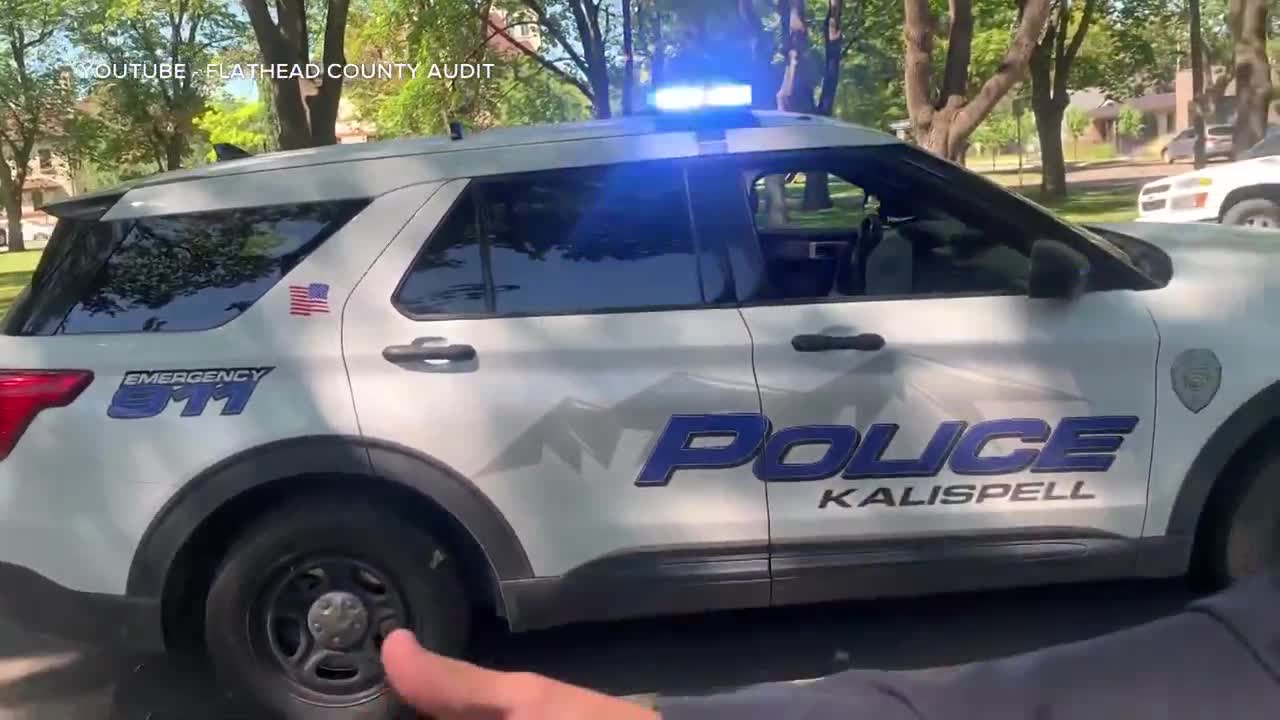HELENA- Montana’s highest court must now decide whether a Kalispell man’s constitutional rights were violated when he was arrested after trying to film a police traffic stop.
The Montana Supreme Court heard oral arguments Wednesday in Sean Doman’s appeal of his conviction for obstructing a peace officer.
Watch the video to see some of the interaction that led to this case:
Doman was riding his bike through a Kalispell neighborhood in July 2022 when he saw Kalispell Police Department Officer Dustin Willey conducting a traffic stop. He stopped and began recording the stop with his phone. The video he took is now posted to Youtube.
When a second officer, George Minaglia, arrived on the scene, he told Doman to move back. The exchange can be seen in Doman’s video.
“First Amendment-protected activity,” Doman told Minaglia.
“Right, I agree, just do me a favor and get out of where we’re working, and you can totally film from like right over here by this tree,” Minaglia responded.
Doman told the officer he wanted to remain close enough to the stopped car that he could record audio and that he was on a public sidewalk.
Minaglia told Doman he could not stay where he was.
“Do you understand that my engagement with you is distracting me from this?” Minaglia asked.
“That’s your fault; that’s not my responsibility,” Doman responded.
Minaglia again asked Doman to move back. When Doman said no, Minaglia can be seen in the video raising his hand to cover the camera, just before the recording ends.

According to Doman’s attorneys, the officer took Doman’s phone and tossed it on the ground, then Doman threatened to sue him.
Attorneys said Doman continued to move back from the stopped car, called Minaglia a “tyrant,” and was then arrested.
Doman went on trial in Kalispell Municipal Court in March of 2023, and a jury found him guilty of obstruction.
He appealed the conviction to Flathead County District Court and finally to the Montana Supreme Court.
“Sean Doman is being criminally punished for exercising his right to record the police in public,” Carrie Gibadlo, an attorney representing Doman, told justices Wednesday.
Gibadlo argued Willey only called Minaglia to the scene because he saw Doman recording, and that it was clear Doman was treated differently than someone who wasn’t attempting to film officers would have been, and that it’s unlawful for officers to put more restrictions on someone because they’re recording.
“If somebody had been standing in their front yard gardening that day, would they have been told they needed to retreat to their house?” Gibadlo asked.

The ACLU of Montana also joined the case in support of Doman.
“The erosion of our constitutional rights is of critical importance to me, and it should be to everybody,” said Alex Rate, the ACLU of Montana’s deputy director and legal director. “If somebody is permitted to be arrested simply for exercising a constitutional right, then we're no longer living in a democracy.”
Thad Tudor, an attorney for the state, defended Doman’s conviction, arguing Doman’s attorneys had an opportunity to raise these concerns earlier in the legal process and didn’t do it.
He said Doman was arrested not because he was recording, but because his presence so close to the stopped car was disrupting the officers’ investigation.
Tudor pointed back to Minaglia, telling Doman he could film, but not where he was standing at the time.
“Those words are spoken clearly, concisely,” he said. “There is no way Doman didn't hear those words; there is no plausible way he didn't understand the words.”

As justices asked questions of the attorneys on both sides, they said they were seeking to determine where the line is between simply recording an officer — a constitutionally-protected action — and actively interfering with them.
Chief Justice Cory Swanson said it appeared to him Doman had “kind of a belligerent attitude,” and asked Gibadlo if he was more interested in police transparency or in escalating the situation.
“I think if it was a set of circumstances where he said, ‘You can stay here, but you can't film,’ again, we’d have flipped that fact pattern on its head,” Swanson said. “So why can't we say officers have the ability to establish a safe buffer around their lawful enforcement activity with the other person, so long as he lets him film from a different distance?”
Gibadlo said whatever line officers are allowed to draw can’t discriminate against someone for recording.
“The only thing that Officer Minaglia knew when he ordered Sean to back up was that he had been called to the scene because somebody had ‘rolled up filming,’” she said.

Justice Laurie McKinnon asked Tudor if the state could point to actions Doman took that went beyond First Amendment protections.
“Counsel, do you feel that recording a stop is injecting yourself into the traffic stop?” McKinnon asked.
“Recording the stop as close as he was was injecting himself into the traffic stop,” said Tudor. “That was the judgment of the officer at the scene, that was the judgment — I would argue — the jury necessarily found to be reasonable.”
As is their usual practice, the justices took no immediate action after Wednesday’s hearing.





